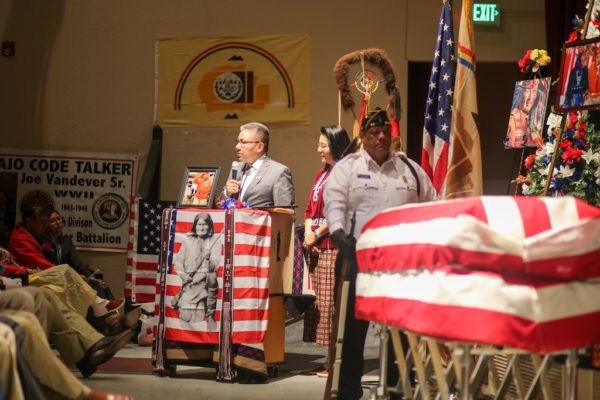
- Details
- By Native News Online Staff
GALLUP, N.M. — The Navajo Nation remembered a war hero on Wednesday. Navajo Nation Vice President Myron Lizer joined hundreds of Navajo citizens, family members, and loved ones at a memorial service to honor the life and memory of Navajo Code Talker Joe Vandever, Sr. at the El Morro Theatre in Gallup, N.M.
Vandever passed away on Jan. 31 at the age of 96 in Haystack, N.M.
During the service, Vice President Lizer presented the proclamation and a Navajo Nation flag to the family of Vandever, and offered his condolences on behalf of the Navajo people.
“As we mourn the loss of Navajo Code Talker Joe Vandever, Sr., we also honor and remember all his great sacrifices for our Navajo people and the entire country. Our thoughts and prayers are with his family, friends, and community members as they lay him to rest,” said Vice President Lizer.
Vandever enlisted with the U.S. Marine Corps in Santa Fe, N.M. on March 26, 1943, and was honorably discharged as Corporal on Jan. 22, 1946. He served in northern Solomons, Bougainville, Emirau Islands, Guam, Marianas Islands, Okinawa, Ryukyus Islands, Occupation of Japan, and Occupation of China. In 2001, he received the Congressional Silver Medal for his service as a Navajo Code Talker in World War II.
Vandever will be laid to rest on Thursday, Feb. 6 at 1:30 p.m. at the Santa Fe National Cemetery in Santa Fe, New Mexico.
More Stories Like This
Native News Weekly (August 25, 2024): D.C. BriefsUS Presidents in Their Own Words Concerning American Indians
Native News Weekly (December 14, 2025): D.C. Briefs
Wounded Knee Massacre Site Protection Bill Passes Congress
Two Murdered on Colville Indian Reservation
Help us defend tribal sovereignty.
At Native News Online, our mission is rooted in telling the stories that strengthen sovereignty and uplift Indigenous voices — not just at year’s end, but every single day.
Because of your generosity last year, we were able to keep our reporters on the ground in tribal communities, at national gatherings and in the halls of Congress — covering the issues that matter most to Indian Country: sovereignty, culture, education, health and economic opportunity.
That support sustained us through a tough year in 2025. Now, as we look to the year ahead, we need your help right now to ensure warrior journalism remains strong — reporting that defends tribal sovereignty, amplifies Native truth, and holds power accountable.
 The stakes couldn't be higher. Your support keeps Native voices heard, Native stories told and Native sovereignty defended.
The stakes couldn't be higher. Your support keeps Native voices heard, Native stories told and Native sovereignty defended.
Stand with Warrior Journalism today.
Levi Rickert (Potawatomi), Editor & Publisher

